方位介词on-over和above-below和under的用法区别 (1)
表示方位的英语短语

表示方位的英语短语今天我们主要学习一下用来表示方位的介词和介词短语。
表示方位的介词和介词短语1. on 介词on表示“在某物之上的意思,它通常表示一个物体在另一个物体之表面上面。
两者之间有接触。
例如:Your book is on the desk. 你的书在课桌上面。
There is a ball on the floor. 地板上有个球。
拓展:above 和over的区别on指的有接触面的上面,但是over 和above都是没有接触面的上面。
over“在……正上方,与under相对。
例如:There is a bridge over the river. 河上有一座桥。
The picture is hanging over the blackboard. 那张图挂在黑板的正上方。
above只表示“在……上方或位置高出……,不一定是正上方,与below 相对。
例如:A plane flew above our heads. 一架飞机从我们头上飞过。
The Turners live above us. 特纳一家人住在我们的上面。
2. in介词in表示“在某物的里面,它通常表示一个物体在另外一个物体的内部、中间或者在某个范围之内。
例如:Your pen is in the pencil case. 你的钢笔在铅笔盒里面。
She is the tallest in her class. 她是她们班最高的。
3. under介词under表示“在某物的下面,它通常表示一个物体在另外一个物体的垂直正下面,两者之间没有接触。
例如:My bike is under the tree. 我的自行车在树的下面。
The shoes are under the chair. 鞋在椅子的下面。
拓展:under和below 的区别under表示“在……之下,通常表示位置处于正下方,与介词over“在……上方相对应。
例如:There is a book under the table. 桌子下面有一本书。
比较above,over,under,below,beneath

常见方位介词用法比较above,over,under,below,beneathabove和overabove(介词和副词)和 over(介词)两者的含义都是higher than(高于),有时可以互换使用:The helicopter hovered above/over us.直升机在我们的上空盘旋。
Flags waved above/over our heads.旗帜在我们头顶上方飘扬。
但 over还可以表示覆盖(covering),在对面(on theother side of),横过(across),从一边到另一边(from one side to the oth- er):We put a rug over him.我们往他身上盖了一块小毛毯。
He lives over the mountain.他住在山的那一边。
There is a bridge over the river.河上有一座桥。
all over+ 名词/代词意为“在每一部分”:He has friends all over the world.他的朋友遍天下。
above则不可能有上述这些意思。
over还可有“多于”或“高于”的意思。
above只有“高于”的意思。
over和 above都可指较高的职位。
但 He is over me通常表示He is my immediate superior(他是我的顶头上司),He super- vises my work(他督导我的工作)。
above则不一定有此含义。
如果河上有一座桥,above the bridge的意思是upstream(在桥的上游)。
over可与meals(饭)/food食物)/drink(饮料)等连用:They had a chat over a cup of tea.他们喝茶时聊着天。
在take+表示时间的词语+over+名词/代词结构中,over可意为to do/finish(去做/完成)等:He doesn′t take bug over lunch/to eat his lunch.他吃午饭没花多长时间。
方位的表达法
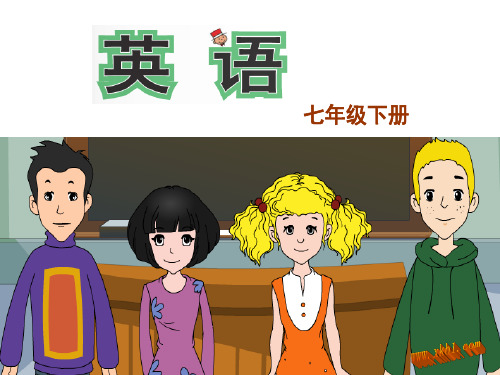
3.你能告诉我到公园的路吗?
Can you tell me the way ________________________to a park?
4.我在哪里可以购物?
Where do some shopping ________can I _________________________?
on the box
in the box
under the box
-Where’s the soccer ball?
-It’s _____ near the box. -Where’s the soccer ball? -It’s ________ next to the box.
-Where’s the soccer ball? -It’s __________ in front of the box. -Where’s the soccer ball? -It’s _________ behind the box.
1) under在……下面/正下方. 如: What's under your desk? 2) below 在……斜下方. 如: Her skirt came below her knees.
3:in 和on表示“在……上”
1.门一类——镶嵌在墙里的,用in, 字画一类——挂在墙面上的,用on. 2.鸟一类落在树上的,用in; 苹果一类长在树上的,用on. 4:in /on/ to表示方位 in表示在某范围之内; to表示在某范围之外; on表示“邻”、“接壤”。 Shanghai lies in the east of China. 上海位于中国东部。 Japan lies to the east of China. 日本在中国东部。 Mongolia(蒙古国)lies on the north of China. 蒙古人民共和国位于中国北部。
under below的用法
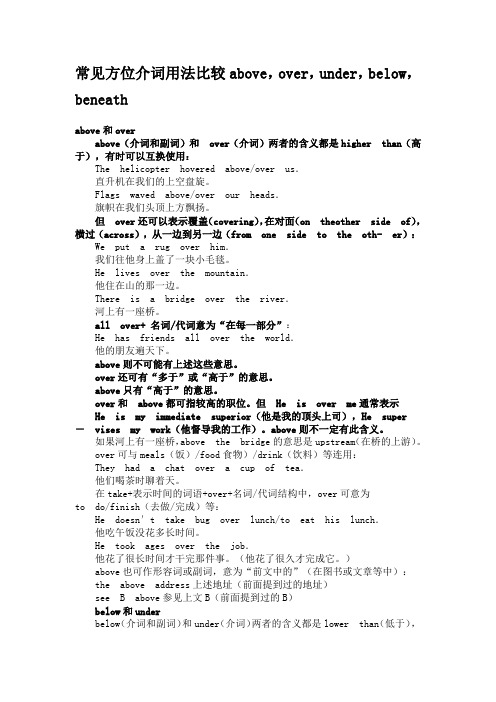
常见方位介词用法比较above,over,under,below,beneathabove和overabove(介词和副词)和over(介词)两者的含义都是higher than(高于),有时可以互换使用:The helicopter hovered above/over us.直升机在我们的上空盘旋。
Flags waved above/over our heads.旗帜在我们头顶上方飘扬。
但over还可以表示覆盖(covering),在对面(on theother side of),横过(across),从一边到另一边(from one side to the oth- er):We put a rug over him.我们往他身上盖了一块小毛毯。
He lives over the mountain.他住在山的那一边。
There is a bridge over the river.河上有一座桥。
all over+ 名词/代词意为“在每一部分”:He has friends all over the world.他的朋友遍天下。
above则不可能有上述这些意思。
over还可有“多于”或“高于”的意思。
above只有“高于”的意思。
over和above都可指较高的职位。
但He is over me通常表示He is my immediate superior(他是我的顶头上司),He super-vises my work(他督导我的工作)。
above则不一定有此含义。
如果河上有一座桥,above the bridge的意思是upstream(在桥的上游)。
over可与meals(饭)/food食物)/drink(饮料)等连用:They had a chat over a cup of tea.他们喝茶时聊着天。
在take+表示时间的词语+over+名词/代词结构中,over可意为to do/finish(去做/完成)等:He doesn′t take bug over lunch/to eat his lunch.他吃午饭没花多长时间。
20个英语方位介词
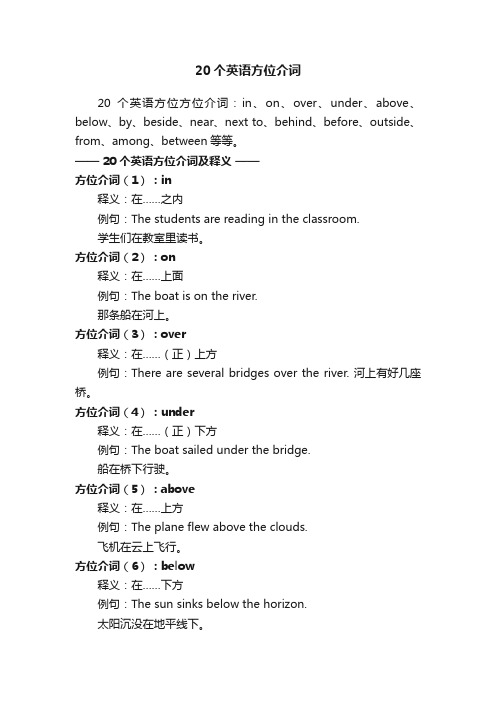
20个英语方位介词20个英语方位方位介词:in、on、over、under、above、below、by、beside、near、next to、behind、before、outside、from、among、between等等。
—— 20个英语方位介词及释义——方位介词(1):in释义:在……之内例句:The students are reading in the classroom.学生们在教室里读书。
方位介词(2):on释义:在……上面例句:The boat is on the river.那条船在河上。
方位介词(3):over释义:在……(正)上方例句:There are several bridges over the river. 河上有好几座桥。
方位介词(4):under释义:在……(正)下方例句:The boat sailed under the bridge.船在桥下行驶。
方位介词(5):above释义:在……上方例句:The plane flew above the clouds.飞机在云上飞行。
方位介词(6):below释义:在……下方例句:The sun sinks below the horizon.太阳沉没在地平线下。
方位介词(7):by释义:在……旁边例句:Our house is by the river.我们的房子在河边。
方位介词(8):beside释义:Come and sit beside me.过来坐在我旁边。
方位介词(9):near释义:在……附近例句:Idon’t need a car becauseIlive nearthecity centre .我不需要汽车,因为我住在靠近市中心方位介词(10):next to释义:紧挨……例句:My best friend sits next to me in class.上课时我最好的朋友坐在我的旁边。
方位介词(11):behind释义:在……后面例句:Olive hid behind a tree.奥列弗藏在一棵树后面。
英语方位的介词,上面,上方,下面,下方的区别.doc

英语方位的介词,上面,上方,下面,下方
的区别
当我们要表达精准方位的时候,我们通常要区分一些英语介词的精确意思。
比如,以下的介词:
on 在某物上面【正上方,接触】
above 在某物上方【不一定接触,不一定是正上方】
这个词还可以表示抽象的“在上面,上面的”
over 越过,超过【不接触】
under 在某物下面【一般指正上面,不一定接触】
beneath 在某物正下方【有接触】
below 在某物下方【不一定接触,不一定是正下方】
这个词还可以表示抽象的“在下面,下面的”
例子:
1.The trees grow well above the water
树木【在水的的上方】长得很好【不接触,不一定是正上方,在这里,一定不是正上方】
2.The pavilion[亭子] is on the passage
那亭子在走道的上面【正上方,接触】
3.The passage is [over the water]
那走道在水的上面【在上方,不接触】
4.It goes over the water
它飞越水面【不接触,表示动态】
5.The passage is [under the pavilion]
那走道在亭子的下面【在这里,接触了】The water is [under the passage]
水在走道的下面【在这里,不接触】
6.The reflections stay [below the trees].
那些倒影停留[在树木的下面]
【不接触】
7.They are beneath the water
那些倒影[在水的下面]
【接触了】。
方位介词
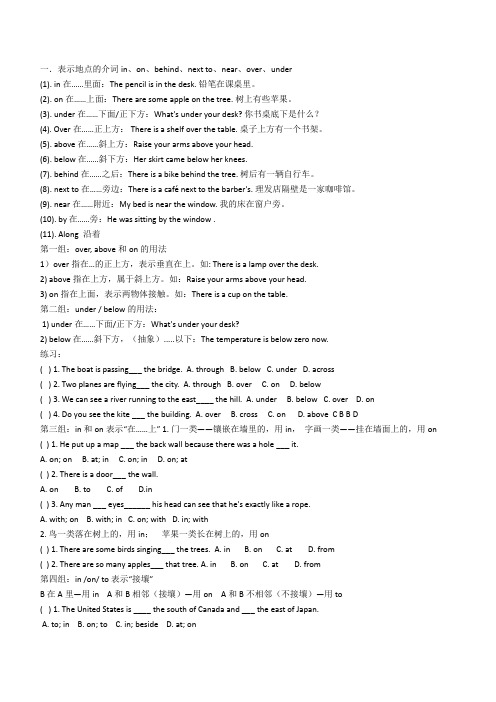
一.表示地点的介词in、on、behind、next to、near、over、under(1). in在……里面:The pencil is in the desk. 铅笔在课桌里。
(2). on在……上面:There are some apple on the tree. 树上有些苹果。
(3). under在……下面/正下方:What's under your desk? 你书桌底下是什么?(4). Over在……正上方: There is a shelf over the table. 桌子上方有一个书架。
(5). above 在……斜上方:Raise your arms above your head.(6). below 在……斜下方:Her skirt came below her knees.(7). behind在……之后:There is a bike behind the tree. 树后有一辆自行车。
(8). next to在……旁边:There is a café next to the barber's. 理发店隔壁是一家咖啡馆。
(9). near在……附近:My bed is near the window. 我的床在窗户旁。
(10). by 在……旁:He was sitting by the window .(11). Along 沿着第一组:over, above和on的用法1)over指在…的正上方,表示垂直在上。
如: There is a lamp over the desk.2) above指在上方,属于斜上方。
如:Raise your arms above your head.3) on指在上面,表示两物体接触。
如:There is a cup on the table.第二组:under / below的用法:1) under在……下面/正下方:What's under your desk?2) below 在……斜下方,(抽象).....以下:The temperature is below zero now.练习:( ) 1. The boat is passing___ the bridge. A. through B. below C. under D. across( ) 2. Two planes are flying___ the city. A. through B. over C. on D. below( ) 3. We can see a river running to the east____ the hill. A. under B. below C. over D. on( ) 4. Do you see the kite ___ the building. A. over B. cross C. on D. above C B B D第三组:in 和on表示“在……上” 1. 门一类——镶嵌在墙里的,用in,字画一类——挂在墙面上的,用on ( ) 1. He put up a map ___ the back wall because there was a hole ___ it.A. on; onB. at; inC. on; inD. on; at( ) 2. There is a door___ the wall.A. onB. toC. ofD.in( ) 3. Any man ___ eyes______ his head can see that he's exactly like a rope.A. with; onB. with; inC. on; withD. in; with2. 鸟一类落在树上的,用in;苹果一类长在树上的,用on( ) 1. There are some birds singing___ the trees. A. in B. on C. at D. from( ) 2. There are so many apples___ that tree. A. in B. on C. at D. from第四组:in /on/ to表示“接壤”B 在A里—用in A和B相邻(接壤)—用on A和B不相邻(不接壤)—用to( ) 1. The United States is ____ the south of Canada and ___ the east of Japan.A. to; inB. on; toC. in; besideD. at; on( ) 2. The man stood____the window, watching the boys playing outside.A. inB. byC. withD. to( ) 3. Japan lies____ the east of China. A. on B. to C. in D. with第五组:at, in表示“在……”at表示较小的地点。
小学英语语法之方位介词
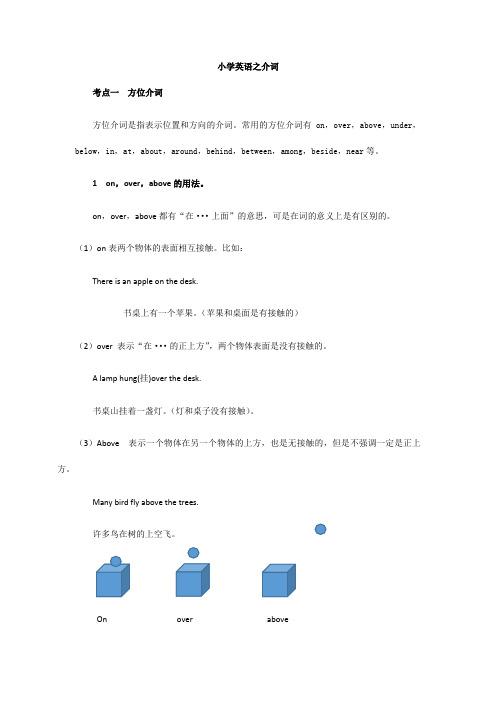
小学英语之介词考点一方位介词方位介词是指表示位置和方向的介词。
常用的方位介词有on,over,above,under,below,in,at,about,around,behind,between,among,beside,near等。
1 on,over,above的用法。
on,over,above都有“在···上面”的意思,可是在词的意义上是有区别的。
(1)on表两个物体的表面相互接触。
比如:There is an apple on the desk.书桌上有一个苹果。
(苹果和桌面是有接触的)(2)over 表示“在···的正上方”,两个物体表面是没有接触的。
A lamp hung(挂)over the desk.书桌山挂着一盏灯。
(灯和桌子没有接触)。
(3)Above 表示一个物体在另一个物体的上方,也是无接触的,但是不强调一定是正上方。
Many bird fly above the trees.许多鸟在树的上空飞。
On over above2 under和below的用法(1)under和below都有“在···的下面”的意思,但是两个词也是有区别的。
Under表示“在···正的下面”。
The cat is under the desk.(2)书桌下面有一只猫。
(强调的是书桌的正下方)below表示“在···的下方”,可是不强调是不是在物体的正下方。
Under below3 in的用法in表示在一个物体的里面My books are in the box.我的书在盒子里。
- 1、下载文档前请自行甄别文档内容的完整性,平台不提供额外的编辑、内容补充、找答案等附加服务。
- 2、"仅部分预览"的文档,不可在线预览部分如存在完整性等问题,可反馈申请退款(可完整预览的文档不适用该条件!)。
- 3、如文档侵犯您的权益,请联系客服反馈,我们会尽快为您处理(人工客服工作时间:9:00-18:30)。
7B第一单元检测试卷一、根据句子意思以及汉语或首字母提示,填写正确得单词。
(10分)1.My_____ (理想的) home is the one with lots of trees and flowers in thegarden.2.There are some small shops ________ (在…..对面) our school.3.What’s on the ________ (架子) ? There are a lot of books on them.4.He often ________(爬)a ladder to get upstairs onto the second floor.5.The _________ (第九)lesson is a little easy.6.The wooden______ desk is made of wood.7.You should be friendly________ to your friends because they are all kind to you.8.My English teacher lives next to my house. She is my neighbour_______9.It’s too noisy (吵闹,喧哗). Let’s find a quiet________ place to talk about our plan.10.His brother is having a shower in the bathroom____________二、根据句子意思,用所给词得正确形式填空。
(10分)1.Do you want _______ (live) in a house in the country?2.Everyone in our family _____ (like) to watch Lucky 52,.3.Liu Xiang is good at _______(run).4.I tell the students _______(not talk) in class.5.It takes him two hours _______ (finish) _______(do) his homework.6.Do you know how many _________(month) there are in a year?7.Simon________(call) Jack______(tell) him about his new school atpresent.8.Will she __share_____(share) her presents with you?、选择填空。
(15分)1.、 1. Jim is ________11-year-old boy.A .an B. a C .the D. /给大家推荐一个英语微信群-Empty Your Cup英语微信群是目前学习英语最有效的方法,群里都是说英语,没有半个中文,而且规则非常严格,是一个超级不错的英语学习环境,群里有好多英语超好的超牛逼的人,还有鬼佬和外国美眉。
其实坦白说,如果自己一个人学习英语太孤独,太寂寞,没有办法坚持,好几次都会半途而废。
只要你加入到那个群里以后,自己就会每天都能在群里坚持学,坚持不停地说和练,由于是付费群,群里的成员学习氛围非常强,每天的训练度都非常猛,本来很懒惰的你一下子就被感染了,不由自主地被带动起来参与操练,不好意思偷懒,别人的刻苦学习精神会不知不觉影响你,Empty Your Cup英语微信群(进群加喂新 601332975)可以彻底治好你的拖延症,里面学员都非常友好,总是给你不断的帮助和鼓励,让你在学英语的路上重新燃起了斗志,因为每天都在运用,你的英语口语就能得到了迅猛的提升,现在可以随便给一个话题,都能用英文滔滔不绝的发表5分钟以上对这个话题的看法和观点,想提高英语口语的 可以加入进来,It really works very well.2. We can find clean bowls and plates in the kitchen________.1.sofa B. computer C. cupboard D. Fridge3. _______ is the capital of Britain.1.Paris B. London C. Washington D.C. D. Sydney4. Which book is _________, this one or that one ?A. betterB. bestC. the betterD. good5. Which is your favourite after you have seen so many houses?A. the biggest oneB. the bigger oneC. the big oneD. the biggest ones6. The teacher asked us to listen to her_______.1.carefully B. careful C. more careful D. Careless7. I want to buy this pair of jeans. Can I_______?A. try on them B .try them on C. try it on D. try on it 8.Sandy scored_______ points , and she came _____on the billboard.A. ninety-eighth, fifthB. ninety-eight, fifthC. ninety-eight, fiveD. ninety-eighth, five9. Lin Tao and I live in the same building. But he lives two floors _____me.A. onB. overC. underD. below10. He sits between______.A. you and sheB. you and herC. she and youD. her and you11. We read 10 206 like this________.A. one thousand, two hundred and sixB. one thousands, two hundred and sixC. ten thousand, two hundred and sixD. ten thousand, two hundred six12. They will arrive _______China _______September 2nd.A. in, onB. at, fromC. in, inD. at, on13._________ the students will go to the island for the picnic.1.Two hundred of B. Two hundred C. Two hundreds of D. Hundreds of14. Im listening to the music_____ my sister is playing with the cat. A. when B. while C. but D. or15. -------I am going on a trip to Xi’an next week., ------- _________.A. Have a good timeB. Thank youC. It’s goodD. Good idea1.Where would2.There are in my house3.different from mine4.is lots of5.is between and6.house with7.What’s doing四、根据要求改写句子。
(10分)1.I’d like to sit next to the supermarket. (划线部分提问)2. My house has two floors. (同义句)3. His home is not the same as my home. (同义句)4. It rains a lot in Thailand. (同义句)5. There is a ruler on the pencil-box. there is an English book under it. (同义句)6. I live in a house. It has ten rooms. (同义句)7.Amy is playing the piano in the next room.(划线部分提问)五、填入适当的介词或副词。
(5分)1.There is an old bridge______ the river.2. I like the skirt ___ some flowers on it.3. Can you finish the work ______his help?4. The boy is looking ______ the sea _______the window5. It’s quite cold. The temperature is ____0ºC.6. You can’t see the hat. It’s ____ the door.7. Wash your hands _______ meals.8. Don’t stay _____. Please come in.9. Be friendly _____the animals. They are our friends.六、翻译句子。
(10分)1.他经常同时听音乐和写信。
2.我每天至少要散步半小时。
3. 你住在哪层楼?我和我的家人住在三楼。
4.在圣诞节早晨,孩子们迫不及待地打开礼物。
5.坐在扶手椅上看电视很舒服。
七、完形填空(10分)Swimming is very popular in summer. People like swimming in summer because water makes them 1 cool. But if you swim in a 2 place, it may not be safe(安全)These years, more than ten people 3 while they were enjoying themselves in the water and 4 of them were students.But some people are 5 not careful in swimming.They often think they swim so 6 that nothing can happen(发生)to them in water. Summer is here again. If you go swimming in summer, don’t forget 7 better swimmers have died (死) in water. They died because they were not careful, not because they 8 swim. So don’t get into water when you are alone(单独的). 9 there is a “No Swimming” sign, don’t get into water, 10. If you remember these, swimming will be safer.( )1. A. felt B. feel C. feeling D. to feel( )2. A. difficult B. small C. right D. Wrong( )3. A. died B. die C. have died D. will die( )4. A. much B. most C. lot D. More( )5. A. yet B. already C. still D. Even( )6. A. fast B. often C. well D. hard( )7. A. what B. that C. which D. who( )8. A. couldn’t B. wouldn’t C.needn’t D. mustn’t( )9. A. Because B. Though C. Whether D. If( )10 A. either B. nor C. also D. too八、阅读(20分)AIt is the afternoon of the Mid-autumn Day. All Yangyang’s friends from London are in his home. They are going to have a dinner party.Yangyang is showing them some photos in the sitting room. His parent’s Mr and Mrs Zhang are cooking in the kitchen. His sister is helping them.Dinner begins at 6:30. All the young people are sitting at the table. Dishes are coming one after another. They all smell (闻起来) wonderful and taste delicious. Everybody enjoys the meal except (除了) Helen. She can not use her chopsticks. She tries again and again and makes the others laugh(笑). At last she has to use a spoon(勺子).Near the end (结束) of the dinner, Yangyang’s parents come and sit between Jack and May. They are happy to be with these young people.After the dinner, Yangyang’s father drives the children to the station. They are going totake the night train to Shanghai, for a short visit.( ) 1.All of Yangyang’s friend’s come from ___________.A. EnglandB. AmericaC. AustraliaD. Canada( ) 2.The Chinese meaning of “chopsticks” is __________.A.叉子 B盘子 C 筷子 D 铲子( ) 3.The Chinese meaning of “enjoy” is _________A 观赏B 品尝C 狼吞虎咽 D细嚼慢咽( ) 4.The children laugh because ___________. A. the food is very delicious.B. they are happy with YangyangC. Mr and Mrs Zhang are very nice to themD. Helen can not use her chopsticks.( ) 5.The children are going to the train station ______ A. on foot B. by bus C. by taxi D. in Mr Zhang’s carBAmerican people like to say “Thank you” when others help them or say something kind to them. People of many countries do so, too. It is a very good habit. You should say “Thank you” when someong passes you the salt on the table, when someone walking ahead of you keeps the door open for you, when someone says you have done your work well, or you have bought a nice thing, or your city is very beautiful. “Thankyou” is used not only between friends, but also between parents and children, brothers and sisters.“Excuse me” is another short sentence they use. When you hear someone say behind you, you know that someone wants to walk past you without touching you. It’s not polite tobreak (打断)others when they are talking. If you want to speak to one of them, say“Excuse me” first, and then begin talking. You should also do so when you begin to cough or make any noise before others.Let’s learn to say “Thank you” and “Excuse me”.( ) 1.You should say “Thank you” when ___________A. You say something kind to othersB. You help others.C. Someone helps you.D. You need others to help you.( ) 2.From the passage we know “Thank you” is ___________ed in the world.ed more often than “Excuse me”ed only by Americansed only between friends( ) 3.You should say “Excuse me’’ if you want to ________A. coughB. make some noiseC. go firstD. all of the above( ) 4. When you are going to ask someone to tell you the way, you should say “________”A. Thank youB. That’s very kind of youC. Excuse meD. I’m sorry ( ) 5.This passage mainly tells us the way __________A. to be happyB. to be politeC. to help othersD. to learn from Americans九、写作。
